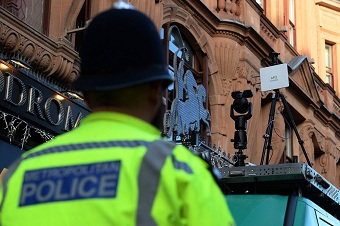Scotland Yard said it will begin using live facial-recognition technology in London to help identify criminal suspects, drawing criticism from privacy advocates who say such tools give the government too much power to track and monitor citizens. The decision comes as the European Union considers following some U.S. cities in banning the technology’s use altogether, underscoring the U.K.’s unusual level of openness to novel forms of surveillance.
London’s Metropolitan Police Service said that it will start using the technology in operations across the capital. The equipment, developed by Japan’s NEC Corp., will be deployed in neighborhoods where intelligence suggests officers are likely to find serious offenders, police said. “The public rightly expect us to use widely available technology to stop criminals,” Assistant Commissioner Nick Ephgrave said in a statement.
Live facial-recognition technology uses artificial intelligence to instantly recognize people in surveillance footage. That makes it a vital tool for law-enforcement agencies, according to its proponents, while its detractors say the technology is unreliable and opens a new front in the global tussle between privacy and security.
Civil-liberties activists expressed concern about the rollout. Big Brother Watch, a campaign group in London, said it would challenge the technology’s use in court, while Liberty International described the Met’s adoption of facial-recognition technology as “dangerous, oppressive and completely unjustified.” The EU is considering proposals to curb or ban some uses of facial-recognition software in public spaces on privacy grounds, while in the U.S., the technology’s adoption with little public fanfare has in some places sparked a backlash. San Francisco and Oakland are among a handful of cities that have forbidden its use.








